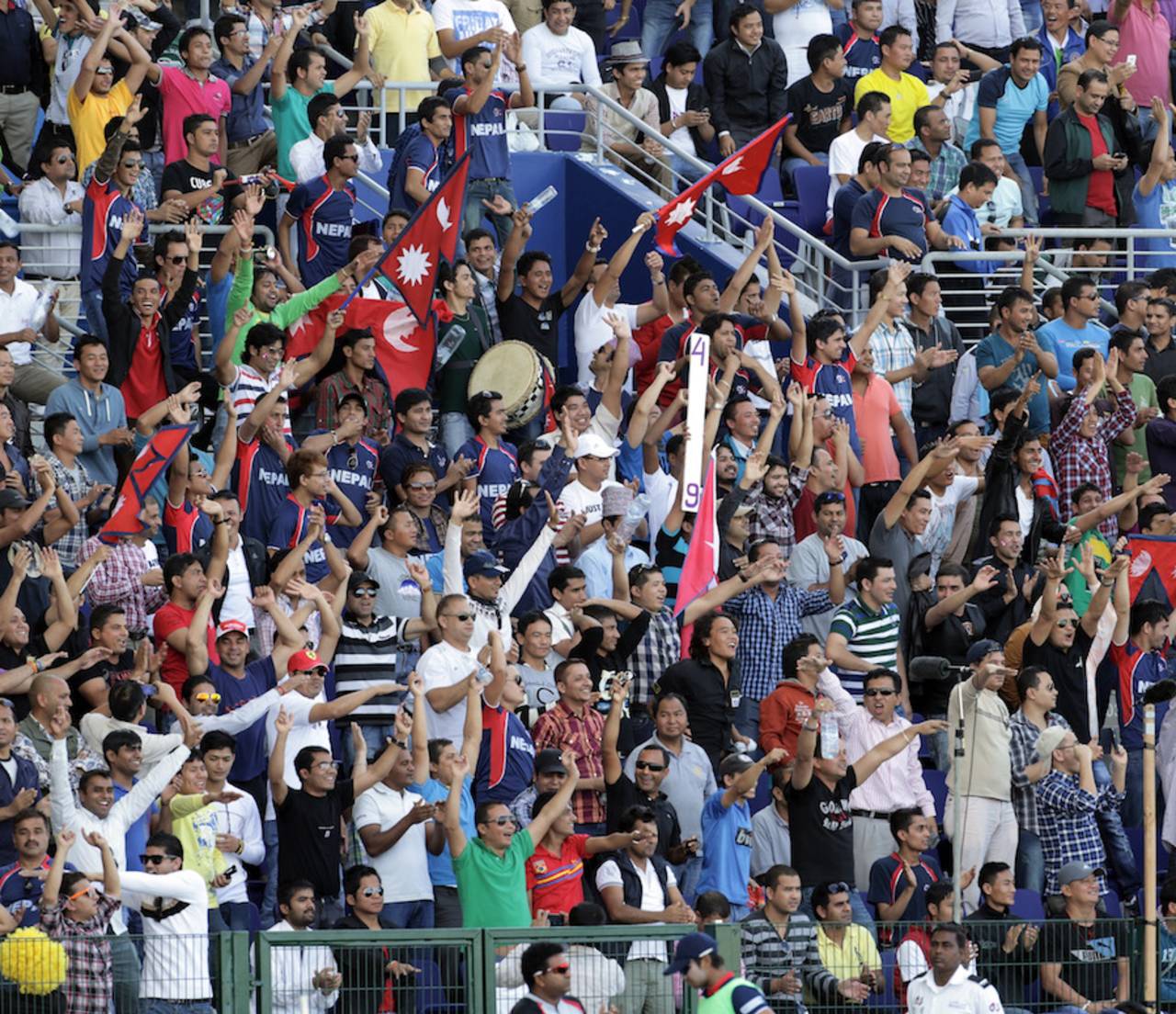Hosts, Associates brace for big first step
Bangladesh, organising its first major tournament, had only been a Full Member for a year or so when the idea was mooted. Now, in an expanded format, the World T20 welcomes three newcomers from the ICC's frontiers
Alan Gardner in Chittagong
15-Mar-2014

Huge following of Associates a worthy reward for ICC's commitment • ICC
For hundreds of years, the geographical area now known as Bangladesh has been a nexus of people: Bengalis, Mughals, the British, merchants from across the globe. The landscape is crisscrossed by rivers, the paths of which are continually shifting. India, with which it shares a 4000km border, looms large in national affairs. It seems an apposite location in which to examine where world cricket has come from, and where it is going.
After more than a decade of Twenty20, the game's shortest, ritziest format continues to drive innovation, expansion and wealth creation. The fifth World Twenty20 may come to be the most powerful confluence of the three yet. Bangladesh, organising its first major tournament, had only been a Full Member for a year or so when Stuart Robertson pitched the idea of T20 cricket at an ECB board meeting in 2001. Now, in an expanded format, the World T20 welcomes three newcomers from the ICC's frontiers.
The aspirations of Nepal, UAE and Hong Kong may not have soared on the back of recent politicking to redistribute world cricket's funds - even if everyone gets richer, the divide will also widen - but here is tangible encouragement: the chance to play against the leading nations. Albeit the chance is small, with the ICC having effectively added a qualifying round to the start of the tournament, pitching the six Associates (which also include Ireland, Afghanistan and Netherlands) against Bangladesh and Zimbabwe for two spots in the main group stage, the Super 10.
The result is a larger, longer World T20 and the first few days could provide something of a slow burn, with games in Groups A and B having to compete for attention against a backdrop of the major teams arriving. Evangelism is what the ICC should be about, however, and recent scenes of celebration in Kabul and Kathmandu have been worthy reward for the governing body's commitment.
It is surely a gamble requiring the hosts to qualify - only the top eight-ranked teams avoid the first round - and grumbles have emanated from the Bangladesh camp but alongside the expectancy which weighs heavy on the team, causing Shakib Al Hasan to murmur cautiously about their chances, there is a sense that the World T20 can surf a wave of local ebullience for the next three weeks. Political strife that at one point threatened the tournament has receded; a Sri Lanka tour and the Asia Cup have passed off successfully. Now the world will be welcomed.
Bangladesh was a co-host of the 2011 World Cup, of course, but the global cricket caravan actually passed through the delta long before, when Dhaka's Bangabandhu Stadium was the venue for the 1998 Wills International Cup (a tournament that gradually morphed into the Champions Trophy). Then, the funds raised to aid the game's development, were some US$10m. Fifteen years on, Bangladesh's government and the BCB have ploughed US$70-80m into renovating stadiums, transport links and infrastructure. Growth, capital, T20.
Such is the importance of putting on a successful show, Bangladeshi authorities have asked the majority of the country's fertiliser factories to close production in order to prevent power cuts in the three stadiums, in Dhaka, Chittagong (where a warm-up game between Afghanistan and Netherlands was affected by floodlight failure) and Sylhet.
Energy of a different sort should be in plentiful supply, even if Bangladesh's participation is not guaranteed beyond three first-round games. Despite being a neutral host for the Wills International Cup, the enthusiastic Bangladeshi support won praise from Wisden. "The moment Bangladesh gets a national team which does them credit, it will be cricket's boom country," wrote Matthew Engel. It is arguable that the prevailing situation remains a case of bust.
The most dangerous Tigers will likely turn out to be in the Sundarbans but the possibility of upsets should prowl all the three venues throughout. Afghanistan and Ireland, who have torn up the second tier to widespread acclaim, will have genuine hope of unseating Bangladesh and Zimbabwe in their respective groups to expand their remit for giant killing.
If there have been fewer surprises at the two most recent World T20s - perhaps an indication that the strong have developed a touch more respect for the weak - the warm-up victory for a vibrant young Hong Kong side over Zimbabwe was a reminder that the format retains a piquant flavour of unpredictability, even as the video tapes roll and the datasheets fill up. The "quants" may rule in the backroom but there is still room for the unquantifiable, particularly at this level.
With eight Asian teams, three European, two African, two Australasian and one Caribbean, the ICC's T20 jamboree is more global than it has ever been. As the players arrive, they will be greeted by ubiquitous corporate signage to go alongside arrangements of fairy lights that carry a little more charm (there will be plenty of time to soak in such sights while negotiating traffic). The cricket world will be watching - a record-breaking potential audience of 1.8 billion, according to the ICC - ready for the "Char, Chokka, Hoi, Hoi" (the name of the official song, which roughly translates as "fours, sixes, fun and games") to begin.
But fun and games are only part of it. In the 16th century, as Europeans began to encroach on south-Asian trade routes, the Dutch referred to Bengal as "the fat meadow". The fact Bangladesh remains one of the poorest countries in the world reflects that prosperity was not for all. The lesson for cricket does not need spelling out.
Alan Gardner is an assistant editor at ESPNcricinfo. He tweets here